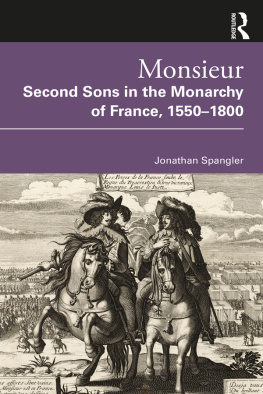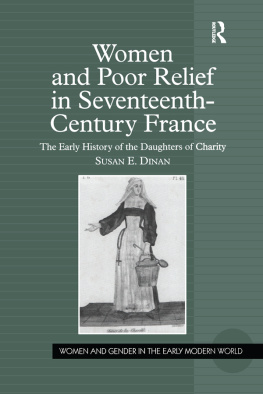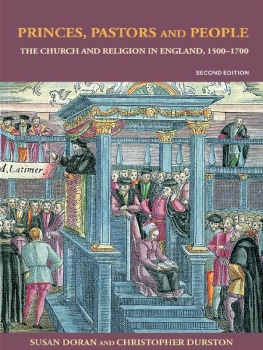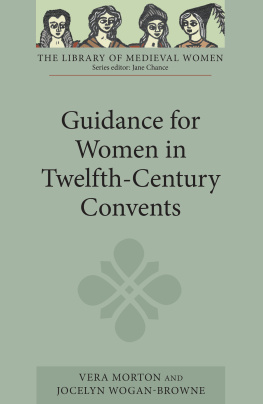The Society of Princes
First published 2009 by Ashgate Publishing
Published 2016 by Routledge
2 Park Square, Milton Park, Abingdon, Oxon OX14 4RN
711 Third Avenue, New York, NY 10017, USA
Routledge is an imprint of the Taylor & Francis Group, an informa business
Copyright Jonathan Spangler 2009
All rights reserved. No part of this book may be reprinted or reproduced or utilised in any form or by any electronic, mechanical, or other means, now known or hereafter invented, including photocopying and recording, or in any information storage or retrieval system, without permission in writing from the publishers.
Notice:
Product or corporate names may be trademarks or registered trademarks, and are used only for identification and explanation without intent to infringe.
Jonathan Spangler has asserted his moral right under the Copyright, Designs and Patents Act, 1988, to be identified as the author of this work.
British Cataloguing in Publication Data
Spangler, Jonathan, 1971
The society of princes : the Lorraine-Guise and the conservation of power and wealth in seventeenth-century France.
1. Guise, House of. 2. France Court and courtiers History 17th century. 3. Nobility France Biography. 4. France History 17th century. 5. France History Louis XIV, 16431715. I. Title 944'.033dc22
Library of Congress Cataloging-in-Publication Data
2008025613
ISBN: 978-0-75465-860-3 (hbk)
ISBN: 978-1-31523-701-5 (ebk)
CONTENTS
List of Illustrations
Acknowledgements
List of Abbreviations
Following page 162
For friends and family: an excellent kinship network
This project has its ultimate origins in a trip my family and I made when I was 14, my first trip to Europe, where we visited the tomb of Emperor Maximilian at the Hofkirche in Innsbruck, and I discovered the power of dynasticism and ancestry (real or forged) in the creation of identity.
Since then I have been fortunate to have been guided by the right people at the right time, and I thank those who encouraged me to follow my interests. From an early age I have had excellent teachers who taught me to be an individual and to take pride in my work. Maryann Brink and Thomas Shepperd at William & Mary taught me that history was both meaningful and frequently amusing. My oldest friends have always supported me in my esoteric passions, and I thank especially Jeff Klingman, Joe Phillips, David Lippert and Seneca Mudd for encouraging me. David Starkey and Robert Oresko first recognised the value of a project about the foreign princes in France, and David Parrott guided it through to completion at New College. In particular, I am grateful to David for teaching me to trust myself. Robin Briggs, Glyn Redworth and Guy Rowlands also provided valuable historical insight and encouragement. I was warmly welcomed and supported at the Early Modern Europe Seminar at the Institute of Historical Research in LondonRoger Mettam, Julian Swann, and the late Stuart Mooreand by other historians across Europe: Lucien Bly in Paris, Leopold Auer and Stephan Sienell in Vienna, and Luc Duerloo in Brussels. I was privileged to have been supported by numerous financial awards, and am indebted to the Read, Zaharoff and Scatcherd funds at Oxford University, the British Academy, and in particular the Royal Historical Societys Centenary Fellowship for fully funding my final year.
Several fellow friends of the early modern period also helped the doctoral period be as enjoyable as I could have hoped, and I especially thank Theresa Weir, Peter Sherlock, Mark Bryant, Sonja Kmec, Edna Yahill, Marc Lerner and Tom Wynn. More recently, Giora Sternberg took the time to read my thesis and gave me feedback for its revision, for which I am grateful. For food, shelter, laughter and computer parts in Oxford, I thank Polly Jones, Tanvi Rai, John Appleby-Alis, Gavin Kelly, Milan Bharadia, Sebastian Kalhat, Shailen Bhandare, Olivier Lessmann and the gang in House 16. Stress relief was always provided in London by Adam Morris, Paul Gray, Chris OLeary and Stephen Pool. In Paris, I was unfailingly taken care of by Jrme Pique, Judith Liberman, Elonore Chaban-Delmas, Ccile Chtignoux, Carina Mrch and Marc Dagorn. A special thank you to Cciles mother for use of her car (!), to Catherine and Bernard Dlouard, my family in Dijon, and to the Mimkes who always have an open door for me in Paderborn, Germany, and encourage me to practise my French!
In the years following the completion of the dissertation, I am thankful to have had the continued encouragement of historians in my field, from Carolyn Lougee- Chappell and Sharon Kettering in the US, to Joe Bergin and Mark Greengrass in the UK. Alison Adams and Stephen Rawles guided me through my first post-doctoral appointment in Glasgow, and didnt mind that I didnt share their passion for French poetry or printing, but appreciated mine for names and symbols. They have at times acted as my surrogate parents in Britain, for which I remain grateful. Judith Loades was fanatical in making me pick up the pen again and getting me started on creating this book. I thank my editors and the anonymous reader from Ashgate for much useful guidance. My new colleagues in the Department of Humanities at the University of Gloucestershire have been very tolerant of me this past year, allowing some of my duties to be pushed to the side temporarily to allow me to concentrate once again on the Guise.
But overall, this work is dedicated to my grandmother, Olivia Compton, and my grandfather, Carl Spangler, who believed firmly in higher education, and to my parents and siblings, who have supported me in every crazy idea I have ever had.
AD | Archives dpartementales |
AGR | Archives gnrales du royaume, Brussels |
AN | Archives nationales, Paris |
AP | Archives prives |
Arsenal | Bibliothque de lArsenal, Paris |
BL | British Library |
BN | Bibliothque nationale de France |
MC | Minutier central |
Ms. Fr. | Manuscrits franais |
NAF | Nouvelles acquisitions franaises |
Contemporary memoirs will be fully cited at first usage, then cited using surname only, followed by volume and page number: e.g. Saint-Simon, XI.345.
There are many names and titles for this multi-branch family, sometimes overlapping. Individuals are listed in the index by title, followed by a number in square brackets indicating their position in the nine genealogical tables in Appendix 1. For example, Louis de Lorraine, comte dArmagnac, will be found under Armagnac [7], that is, in , Table 7.
Introduction
In 1688, four members of the House of Lorraine-Guise were inducted into the Order of the Saint-Esprit, the most exclusive honour awarded by the Bourbon monarchy, and a very public display of royal favour. Most of those promoted were top-ranking ecclesiastics, marshals of France, or dukes and peers; yet the four Lorraines possessed none of these qualifications, and one of them was under age according to the statutes of the Order. Members of the family had been promoted to the Order before, but these had nearly always been cardinals or dukes. The promotion of 1688 also marked 100 years (almost to the day) from the double assassinations of the duc de Guise and the cardinal de Guise at Blois. The murders of 23 and 24 December 1588 had shocked Europe, alienated the Pope and the King of Spain from the








